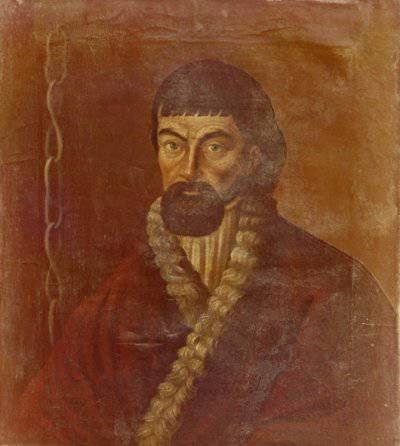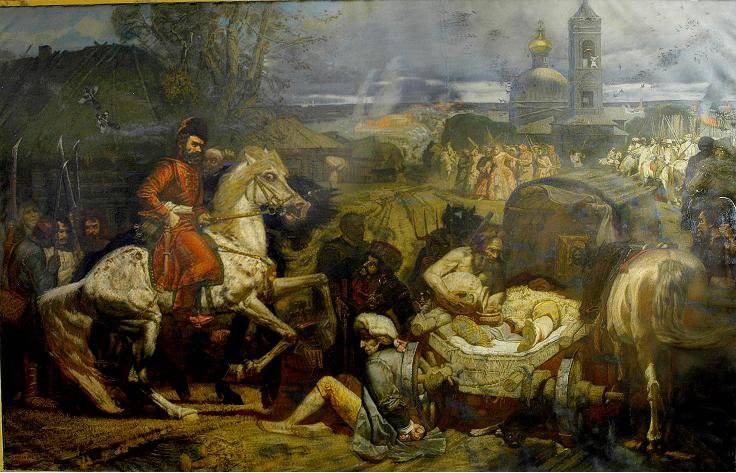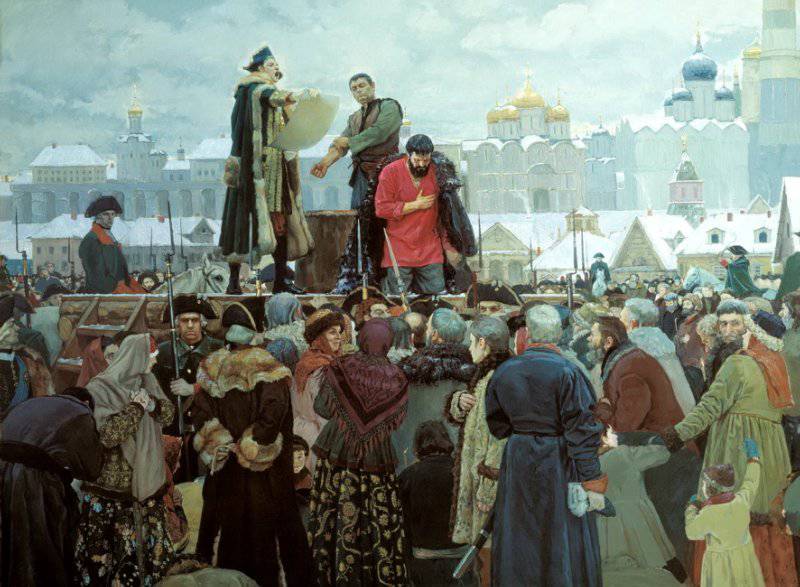Emelyan Pugachev - a rebel or ...
 Many in stories Russia was peasant wars, uprisings and riots. For several centuries, a patient and long-suffering people rebelled against their oppressors and cruelly punished them for their greed and heartlessness. Each time a certain mysterious personality appeared on the crest of the people's wrath, which was the whole force of popular indignation. Such an embodiment of bloody madness was Stenka Razin, Emelyan Pugachev had the same image. Born in the same village, they had a similar fate and played a big role in the life of the Russian Empire. Their tragic end was also common.
Many in stories Russia was peasant wars, uprisings and riots. For several centuries, a patient and long-suffering people rebelled against their oppressors and cruelly punished them for their greed and heartlessness. Each time a certain mysterious personality appeared on the crest of the people's wrath, which was the whole force of popular indignation. Such an embodiment of bloody madness was Stenka Razin, Emelyan Pugachev had the same image. Born in the same village, they had a similar fate and played a big role in the life of the Russian Empire. Their tragic end was also common.Considering the “Pugachevschina”, it is necessary to establish what this terrible and bloody phenomenon was. The movement cannot be called a peasant war, since workers from the Ural factories, free roving people, and even noblemen joined the insurgents. The clergy and the military also came over to Pugachev’s side. The core of the army, as well as the uprising of Razin, remained a free and freedom-loving Cossacks. Most historians call the rise of the Russian people a revolt, and therefore we will join them and agree with this point of view.
Prerequisites for the emergence of the main rebel was enough. The reign of Catherine II, although called the “golden age of enlightenment,” cannot be called so fully. The Empress paid more attention to the nobles and the state administration, while in relation to the peasants, workers and Cossacks, the measures taken were depressing. Free Zaporozhye was subjected to strict subordination by state governors, starting with the development of Orenburg and the appointment of a representative of imperial power to the city. Cossacks were forced to carry certain duties, the most difficult of which was obligatory service in the ranks of the regular army. Repeated unrest on the Don was brutally suppressed, and brave and glorious warriors were subjected to humiliation in the form of public flogging and tearing out nostrils, which served as an additional irritant.
Emelyan Pugachev from his youth was notable for his violent temper, for which he often had a bit of whips. In the village, according to historical information, he had a lawful wife, Sophia, and children, whom he often left and wandered, embarrassing the people and calling for action. Contemporaries claim that Pugachev was outwardly similar to Peter Fedorovich, but it was hardly possible to trust such rumors, as the population often could not even accurately describe the ruling sovereign, not to mention her late spouse. Did the Don Cossacks believe that Emelyan, who came from Poland, really is Peter 3 or not? Even today there are the most courageous points of view on this fact, which feeds their strange behavior of the monarchs in relation to the relatives of the executed rebel. Both wives and children of Pugachev were imprisoned for the rest of their lives and died without posterity. They were strictly isolated by Catherine II, refused to let go of Paul and subsequent rulers, which raises some doubts about the veracity of the official version of the origin of the eighth impostor.
The appearance of 1772, the new rebel on the Don, immediately attracted the attention of the governor. At that time, Yemelyan Ivanovich had a great experience of military battles. He visited the battles of the Seven Years and the Turkish Wars and understood military affairs well. His stories about his royal origin forced the local authorities to react, as a result of which Pugachev was captured and taken to Kazan for trial and punishment. However, the successful and already known enough impostor soon escaped and reappeared among the Cossacks.
In September, 1773 Pugachev announces his first imperial edict, in which he calls the Cossacks to action and promises them former freedom and liberties. The text of the appeal also contained cherished words about exemption from the poll tax and freedom, which played a significant role in attracting the peasants to participate in the uprising. It is not surprising that a lot of volunteers were recruited into the squadron, however the squadron was still few in number, although it consisted of professional warriors who owned weapons from an early age. Attempts to take Yaik were unsuccessful, despite the fact that the rebel detachment was growing rapidly. After brief attempts to invade the city, Pugachev went further and set up a military camp near the Iletsky settlement. Here, the rebel again played the role of Peter Fyodorovich escaped and accepted a multitude of people into the ranks of the insurgents, after which the main forces moved to Orenburg, taking several fortresses along the way. The first stage of the rebellion led by Pugachev lasts until the siege is lifted from this glorious city. Then followed a series of small clashes with the imperial forces and the capture of fortresses. The rebel movement went with alternate success, but was essentially supported by the unrest of the serfs and workers. Finally, there was the first serious defeat of the rebellious army by the army under the command of Michels. The uprising finally ended only after the devastating defeat of the impostor at Black Yar. The leader was issued to the authorities for trial. The execution took place on Bolotnaya Square and consisted of quartering. However, unlike Razin’s execution, Pugachev’s head was cut off immediately and death was less painful. Emelyan Ivanovich behaved with dignity, which is characteristic of the proud Don Cossacks.

The military art of Yemelyan Ivanovich and the support of the Don Cossacks allowed to capture many fortresses, cities, factories, but since the first stage, the rebel was perceived by the population ambiguous. Some cities and fortresses occupied self-defense, and residents voluntarily assisted the imperial authorities in the fight against the rebels. This behavior is associated with the incredible cruelty of the rebels. Captured cities literally bled to death the townspeople. The rebels raped women and killed children, made drunken fights and brutally cracked down on officials. The rebels practiced robbery. Even the confessors could not escape from them, they were also tormented and tortured, which more often instilled horror in the hearts of civilians than other feelings. However, it is worth making a reservation that cruelty on the part of the punishers was practiced no less, although it manifested itself selectively.
Describing the events of "Pugachev" should focus on the strange behavior of the Empress in relation to Yemelyan Ivanovich. First, she called him "Marquis", and the question of what this nickname was connected with has not yet been resolved. Secondly, the empress was afraid even of the executed rebel, which is confirmed by the desire of imperial officials to sharpen his living relatives in eternal bondage. All property and documents were immediately seized and destroyed, or transferred to secret archives, the authorities sought to eliminate all references to this person.

Third, the discussions themselves about the uprising and its causes were considered a violation of the law under Catherine II. What was the empress so afraid of, and why did the rebel so much disturb the succeeding monarchs? We are unlikely to know this, since most of the documents about him were carefully hidden or destroyed. However, there are opinions that prominent French and Polish influential figures stood behind Pugachev’s back.
Since this information is extremely controversial and based on unverified facts, they should not be trusted unconditionally, but it is still necessary to think about the real reasons for the strange behavior of royal persons.

Information